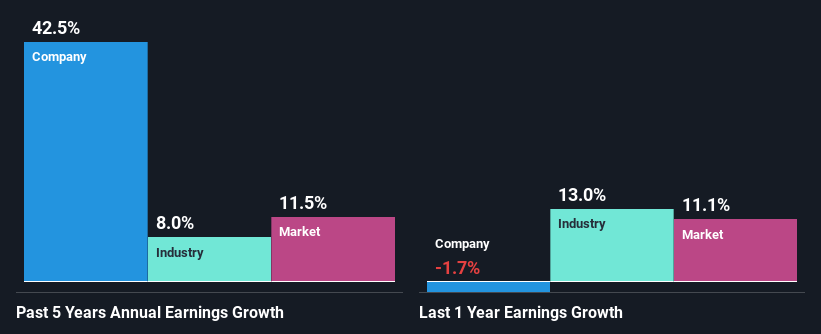Kuraray Co., Ltd.'s (TSE:3405) Stock On An Uptrend: Could Fundamentals Be Driving The Momentum?
Kuraray's (TSE:3405) stock is up by a considerable 12% over the past three months. We wonder if and what role the company's financials play in that price change as a company's long-term fundamentals usually dictate market outcomes. Specifically, we decided to study Kuraray's ROE in this article.
Return on Equity or ROE is a test of how effectively a company is growing its value and managing investors’ money. In simpler terms, it measures the profitability of a company in relation to shareholder's equity.
See our latest analysis for Kuraray
How Is ROE Calculated?
The formula for ROE is:
Return on Equity = Net Profit (from continuing operations) ÷ Shareholders' Equity
So, based on the above formula, the ROE for Kuraray is:
6.2% = JP¥51b ÷ JP¥819b (Based on the trailing twelve months to June 2024).
The 'return' is the profit over the last twelve months. So, this means that for every ¥1 of its shareholder's investments, the company generates a profit of ¥0.06.
What Has ROE Got To Do With Earnings Growth?
So far, we've learned that ROE is a measure of a company's profitability. Depending on how much of these profits the company reinvests or "retains", and how effectively it does so, we are then able to assess a company’s earnings growth potential. Generally speaking, other things being equal, firms with a high return on equity and profit retention, have a higher growth rate than firms that don’t share these attributes.
A Side By Side comparison of Kuraray's Earnings Growth And 6.2% ROE
On the face of it, Kuraray's ROE is not much to talk about. However, given that the company's ROE is similar to the average industry ROE of 6.9%, we may spare it some thought. Moreover, we are quite pleased to see that Kuraray's net income grew significantly at a rate of 43% over the last five years. Taking into consideration that the ROE is not particularly high, we reckon that there could also be other factors at play which could be influencing the company's growth. Such as - high earnings retention or an efficient management in place.
Next, on comparing with the industry net income growth, we found that Kuraray's growth is quite high when compared to the industry average growth of 8.0% in the same period, which is great to see.

Earnings growth is an important metric to consider when valuing a stock. It’s important for an investor to know whether the market has priced in the company's expected earnings growth (or decline). This then helps them determine if the stock is placed for a bright or bleak future. If you're wondering about Kuraray's's valuation, check out this gauge of its price-to-earnings ratio, as compared to its industry.
Is Kuraray Making Efficient Use Of Its Profits?
Kuraray's three-year median payout ratio is a pretty moderate 31%, meaning the company retains 69% of its income. This suggests that its dividend is well covered, and given the high growth we discussed above, it looks like Kuraray is reinvesting its earnings efficiently.
Moreover, Kuraray is determined to keep sharing its profits with shareholders which we infer from its long history of paying a dividend for at least ten years.
Summary
Overall, we feel that Kuraray certainly does have some positive factors to consider. Despite its low rate of return, the fact that the company reinvests a very high portion of its profits into its business, no doubt contributed to its high earnings growth. That being so, a study of the latest analyst forecasts show that the company is expected to see a slowdown in its future earnings growth. To know more about the latest analysts predictions for the company, check out this visualization of analyst forecasts for the company.
Have feedback on this article? Concerned about the content? Get in touch with us directly. Alternatively, email editorial-team (at) simplywallst.com.
This article by Simply Wall St is general in nature. We provide commentary based on historical data and analyst forecasts only using an unbiased methodology and our articles are not intended to be financial advice. It does not constitute a recommendation to buy or sell any stock, and does not take account of your objectives, or your financial situation. We aim to bring you long-term focused analysis driven by fundamental data. Note that our analysis may not factor in the latest price-sensitive company announcements or qualitative material. Simply Wall St has no position in any stocks mentioned.
 Index Options
Index Options CME Group
CME Group Nasdaq
Nasdaq Cboe
Cboe TradingView
TradingView Wall Street Journal
Wall Street Journal